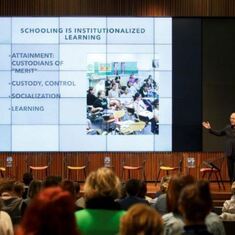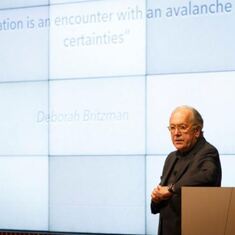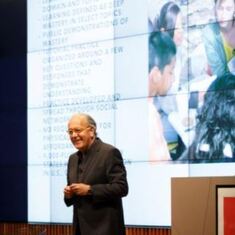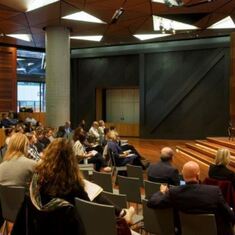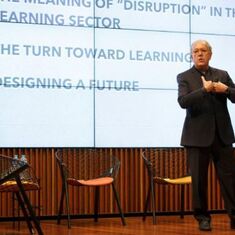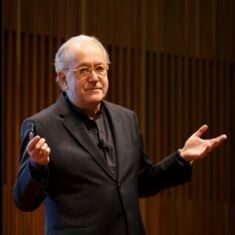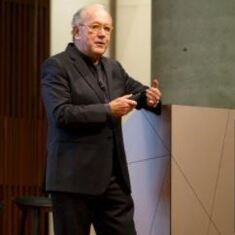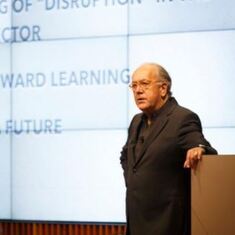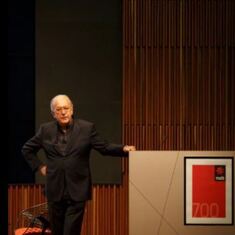When I reflect on who my dad was and the difference he made in my life I am drawn to two spaces.
I am first drawn to Boston’s Museum of Fine Arts in the late-morning on a crisp New England fall day. My dad has taken my kids and me to share and soak in one of his favorite locations. It is clear that he knows this space and the exhibits like the back of his hand; he could easily lead us to those exhibits that contain the most impactful, beautiful, and meaningful works. Instead, he affords that space to my four-year-old daughter and seven-year-old son. “Where do you think we should go? What do you want to see?” As my children lead the way, my dad meets their observations with sincere wonderment and a loving affirmation of their insights.
Only when he has allowed them to offer their own takes on what they see does he chime in with his own understanding of the work, gently and kindly weaving socio-historical context with artistic method and approach. Remarkably, his analysis is as accessible to me as it is to my kids. This is the mark of a true and thoughtful educator, as well as a caring and loving grandfather.
I am next drawn to his kitchen in the late afternoon of that same day. I am perched on the stool adjoining his kitchen and dining room, watching him work his magic as he prepares a dinner that brilliantly blends comfort and whatever vegetables happened to look best that day. No recipe, no preconceived plan, just decades of experience coupled with trial and error. In the background plays Bill Evans, the Ahmad Jamal Trio, Coltrane; the soundtrack of our relationship, as he introduced me to so many artists that, to the disdain of my children, have become a regular part of our own family soundtrack. We start talking shop. I share my recent successes and struggles in my own teaching life, and he absorbs them as if they were as consequential as the work he was doing with a cohort of Connecticut school principals or his EdLD cohorts working to reshape the future of American education.
He listened, affirmed my feelings and experiences, and gently reminded me that I have the power to change what happens in my own educational realm. Kids seem bored? Ask what you can do to better engage them. Students distracted by technology? What are you doing (or not doing) that allows them to be distracted? Difficult questions for a teacher to consider, and those questions that, as an educator he reminded me that I should constantly ask myself. Simply put, he was not just a loving father and grandfather for me, but his perspective and experience allowed him to help and coach me in a way that never felt judgmental or overbearing. Yet, his convictions were clear and forceful; he just wanted me to do right by my learners. The remembrances that have poured in from his students and colleagues show that he worked to do the same.
These two spaces reflect so much of who Richard Elmore was. Kind, loving, curious, he was the very definition of a lifelong learner.
My dad grew up in Wenatchee, Washington, a small town in the middle of the state known for its apple orchards and proximity to both the Columbia River and the eastern slope of the Cascade mountain range. He struggled to find inspiration in the classrooms of Wenatchee High School, finding it instead in the natural beauty surrounding Wenatchee. He worked on survey crews around the area, and helped to run a YMCA camp in the woods, where he eventually met his first wife, Lynn. While most of his peers hoped to find their way into finance or agriculture, Richard found he was more interested in social justice. This took him on several trips outside of Wenatchee with a national YMCA organization focused on youth leadership. He toured the segregated south with a desegregated group of young people, travelled to Washington D.C. to meet with legislators and national leaders. This engendered in my dad a desire to engage in the world beyond Wenatchee.
He made his way to Whitman College, a small liberal-arts college in Walla Walla, Washington. In Walla Walla, he found himself completely unprepared for the learning experience in front of him, but also inspired by a world in which ideas, words, and convictions mattered - the world of academia. From Whitman, he went to Claremont for his Masters in Public Policy, and then on to Harvard where he earned his Ed.D.
Richard began his academic life at the Evans School of Public Affairs, then moved to the School of Education at Michigan State University, finally landing at the School of Education at Harvard University in 1990. There he taught and engaged with thousands of students and colleagues around the world, focusing initially on big picture aspects of policy and planning at the state and federal level, and ultimately becoming known for helping educators best understand how to reach their learners. I love the fact that once my dad realized the improbability of substantive institutional reform, he shifted his focus on helping communities of educators and learners from Mexico, San Diego, Chile, incarcerated educators in California’s Central Valley, Australia, China, and here in the United States figure out what they could do to make an impact on the unique group of students in front of them.
After pissing off his colleagues and finally refusing to attend Senior Faculty meetings (my stepmother’s assessment), he retired in 2014, where he focused--at long last--on painting, drawing and photography. One of his stepsons jokes that Richard learned to paint by reading about color theory for 2 years, making thousands of notes in innumerable journals, buying half a library of art books, going to the Boston MFA once a week for 6 years, and buying--literally--at least one of everything in the BLICK catalogue. He was happiest in his introvert paradise of a basement on Chestnut Ave, fiddling away with his paints and his pictures, creating beauty one canvas at a time.
I have spent the last several days attempting to locate my deep sadness surrounding the loss of my father. It goes deeper than losing a parent, which is difficult in and of itself. My dad and I had a complicated relationship, and there were relatively long stretches when we did not talk. However, the last couple of years were really good.
I enrolled in an EdD program about 18 months ago, making my way through the joys of Research Methods and Applied Statistics, and my dad helped me contextualize the proverbial hazing of first-year doctoral students. As my work increased in complexity I began to see correlations between the work at the end of his career, our conversations in his kitchen, and my own educational research passions. I now recognize that I will miss not only his sweet, playful demeanor with my kids, and his warm, loving approach to my wife, Amy, and me; I will also miss having someone to cheer me on and encourage me through the difficult times I know lay ahead of me. He and I were kindred spirits in our love of teaching and our love of the work teachers do. We also both realized that too few educators share our passion for thoughtful craft and practice. I did not just lose my dad, I lost an ally and somebody with a breadth of experience to help me understand that my questioning of traditional pedagogy and approach was spot-on and that my work had to be grounded in a careful balance of experience, expertise, and an understanding of who should come first in every situation: the learner.
I hope that I find a new mentor who will help engender the same thoughtful and careful approach of my dad. I will miss the care and the love he extended to my family and me. I look forward to carrying on the difficult work he dedicated himself to for so many years. And I am comforted knowing that I will do so along with so many of his former students and colleagues. He wouldn’t have it any other way.
-Toby, February 12, 2021
